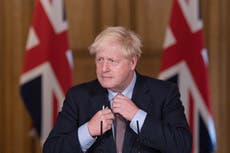Boris Johnson now faces four Brexit rebellions – including one from himself
The lunacy of our withdrawal from the EU has finally ascended to a place where only dogs can hear it

It’s unfortunate to have to do this as early as the very first sentence but just so you know, the forthcoming column is nominally a work of satire. It is my job to make fun of politicians, to point out the hypocrisy and absurdity of what they’re up to.
But oh my goodness – and not for the first time – there is almost nothing to distinguish the following from other straightforward news reports to be found elsewhere on this website.
And so we begin.
The prime minister, having called a general election to secure the backing of his party and his country for his “oven-ready deal” with the EU, having purged the Tory party of almost all its moderate voices, and having won an 80-seat majority for doing it, now faces four separate rebellions over the deal, one of which is his own.
We ran out of hyperbole years ago. Those of us who write about Brexit for a living should arguably have held something back for now. Suddenly it’s clear that we’ve all been shouting along to “Livin’ On A Prayer” for four and a half years and now the final chorus is coming up, the key change has kicked in and we can’t get anywhere near it. British politics now exists in a realm where only dogs can hear it.
To go through these four rebellions one by one:
First, you have Boris Johnson rebelling against his own deal on the grounds that “it never made sense” and so is legislating to undermine it in the House of Commons, via a piece of legislation called the Internal Market Bill, which his government has breezily admitted breaks international law.
In his defence, he seeks to claim that the EU is trying to obstruct the free movement of food and other goods between Northern Ireland and the rest of the UK, and so action must be taken. The truth or otherwise of this is fiendishly complex, but it will do merely to say that it was for precisely this reason that Theresa May rejected the deal Johnson agreed and is now rejecting, on the grounds that “no British prime minister could ever agree to it”.
In May’s defence, she said these words before that list included Johnson, who did agree to it, and is now very publicly disagreeing with himself, in the style of Alan Partridge’s one-man argument in his car with an imaginary Chris Rea, and is expecting other people to take the blame.
Second, led by the softly spoken Sir Bob Neill, you have what’s left of the Tory moderates, who arguably should have stood down instead of supporting the withdrawal agreement, now reduced to a state of semi horror and having to try and force through an agreement they loathe anyway.
Third, you have Michael Howard, now Lord Howard, who you may recall is so keen on Brexit that he was happy to accidentally declare war on Spain over it from the comfort of his sofa one Sunday morning, and other Conservative members of the House of Lords who will be doing all they can to ensure the legislation does not pass.
And then last and absolutely always least, you have the European Research Group, known as the ERG. Indeed it is to the ERG’s great good fortune that it is known as the ERG. If it were more ordinarily referred to by its full title, more people might spot that it contains both the words “European” and “research”, and yet over the last five days, several of its members have appeared on television and in the newspapers to explain that in the two months at the end of last year, when they fought a general election on the basis of the withdrawal agreement, won it by miles and then voted it through, it was in fact, “unforeseen” (Iain Duncan Smith) that it was not Brexit after all.
There have always been doubts about whether the members of the European Research Group were ever really in it for the research. Until now, to illustrate the quality of research to be found within the European Research Group, I have occasionally liked to point out that Nadine Dorries is one of its members, and a week after the referendum in 2016, she explained how “the Norway model has always been my preference”.
Which is to say, until then her preference had “always” been to stay in the single market, to keep free movement of people and to keep making huge payments into the EU budget. She changed her mind on that shortly after she found what it actually meant, and would more recently come to describe Norway model supporters in her own party as “traitors”.
But that’s well within the audible range of Brexit lunacy these days. If taking a year to realise what the most important bit of European legislation in half a century actually meant is a ten on the “research scale”, has anything else scored above a one?
Where we go next is hard to say. Will any of us even be able to see or hear it? For those of us who’ve been screaming our throats hoarse at the madness of it all for four and a half long years, we’ve been psychologically in the cab home from the Brexit House of Horrors for some time. Let them do their worst, the catastrati orchestra of agreeable dunces and lunatics. Let no one say that they haven’t been warned.
Join our commenting forum
Join thought-provoking conversations, follow other Independent readers and see their replies
Comments



Bookmark popover
Removed from bookmarks